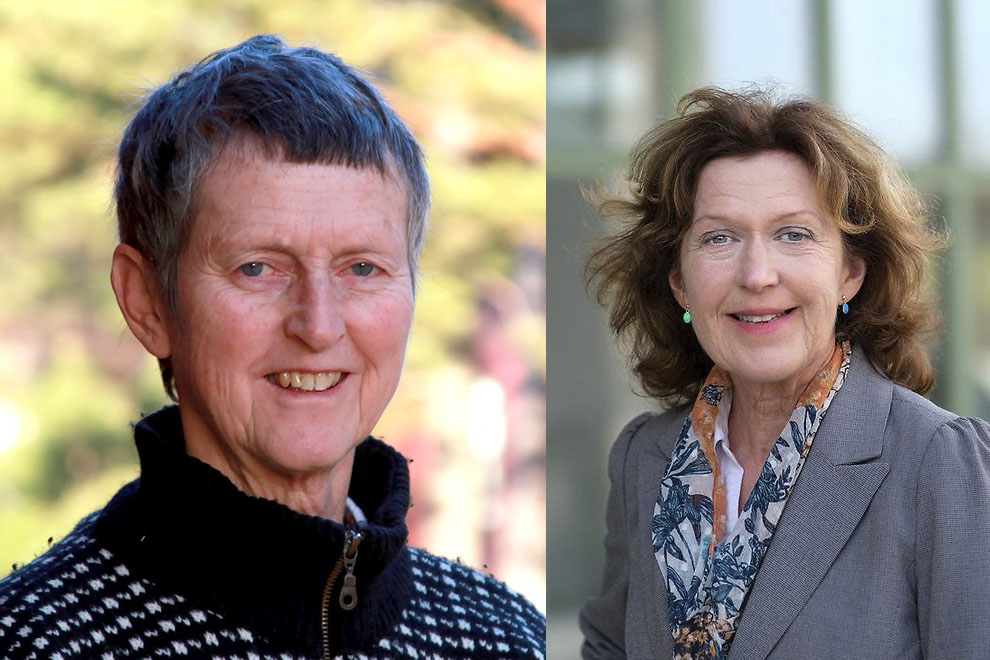News about Memfis • 28 September 2023
Linda Laikre and Kerstin Johannesson on genetic monitoring
Professors Johannesson and Laikre emphasize the need of knowledge on population structure of all species we harvest from the ocean. Through genetic monitoring we can assure that our fisheries do not harm the adaptive capacity of populations.

Kerstin Johannesson and Linda Laikre, professors
What does the ocean mean to you?
– The ocean is home for biodiversity that is crucial for the Earth. This biodiversity includes animals, plants and microorganisms that interact in complex ecosystems of which we still have much to learn. The basis for all this diversity is genetic variation – DNA-level diversity that is the key to long term survival and adaptation for all organisms
What human-caused effects or changes have you seen in the ocean over the years?
– The large-scale exploitation of fish populations that causes collaps after collaps. Fisheries are often not sustainable and mostly neglects genetic diversity. We need to have knowledge on the population structure of all species we harvest from the ocean and via genetic monitoring assure that our fisheries do not harm the adaptive capacity of populations
The MEMFIS conference is about marine environmental monitoring – why/how/what is that important from your point of view?
– Monitoring is a necessary tool to assure that agreed policy is implemented. For instance, the UN Convention on Biological Diversity adopted a new Global Biodiversity Framework in Montreal in December 2022. In this framework monitoring is key and new biodiversity indicators are introduced. Genetic diversity is high on the agenda because of increasing understanding that DNA-variation is key to the adaptive capacity of populations.
How does you/your work contribute to more effective environmental monitoring in the sea? What will you talk about at the conference?
– We provide knowledge and guidance on how genetic diversity can be monitored in aquatic species. Sweden and the Swedish Agency for Marine and Water Management are at the international forefront in this context.
With the future in focus – how can we give back to nature by sharing and caring?
– By making sure that we are following international and national policy to protect, conserve and sustainably use ocean resources. Best scientific knowledge must be put to use.
Name: Linda Laikre & Kerstin Johannesson
Title: Professors
Key achievements: Describing population genetic structures of several marine and freshwater species from Swedish lakes and coastal waters, which is urgent knowledge for management of sustainable populations. This knowledge lead SWAM to start genetic monitoring of some key species.
Favorite water place and why? Linda: Lilla Bävervattnet and associated waters in Hotagen Nature reserve where we run a long-term monitoring project on genetic diversity in brown trout since the 1980s. Kerstin: Kosterhavet, the only Swedish marine national park with hundreds of small islands, where I have conducted genetic studies on speciation in snails for +40 years.
Fler nyheter
-
News about Memfis • 2023-11-16
In November, SwAM and Formas arranged a two-day conference – Marine environmental monitoring for future innovation and sustainability, MEMFIS. The conference brought together more than 120 participants from eight countries; decision makers and experts on marine monitoring from areas such as policy, management, research and innovation.
-
News about Memfis • 2023-11-07
Only two days left until MEMFIS.
-
News about Memfis • 2023-11-02
In a week the first international conference on the future of marine environmental monitoring will take place in Sweden with focus on innovation and sustainability. SwAM and Formas are happy to welcome participants from eight countries to two days of exciting talks, inspiring poster sessions and time for networking.



